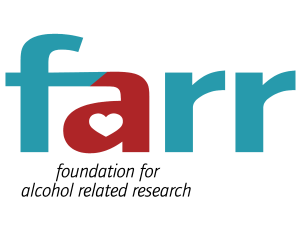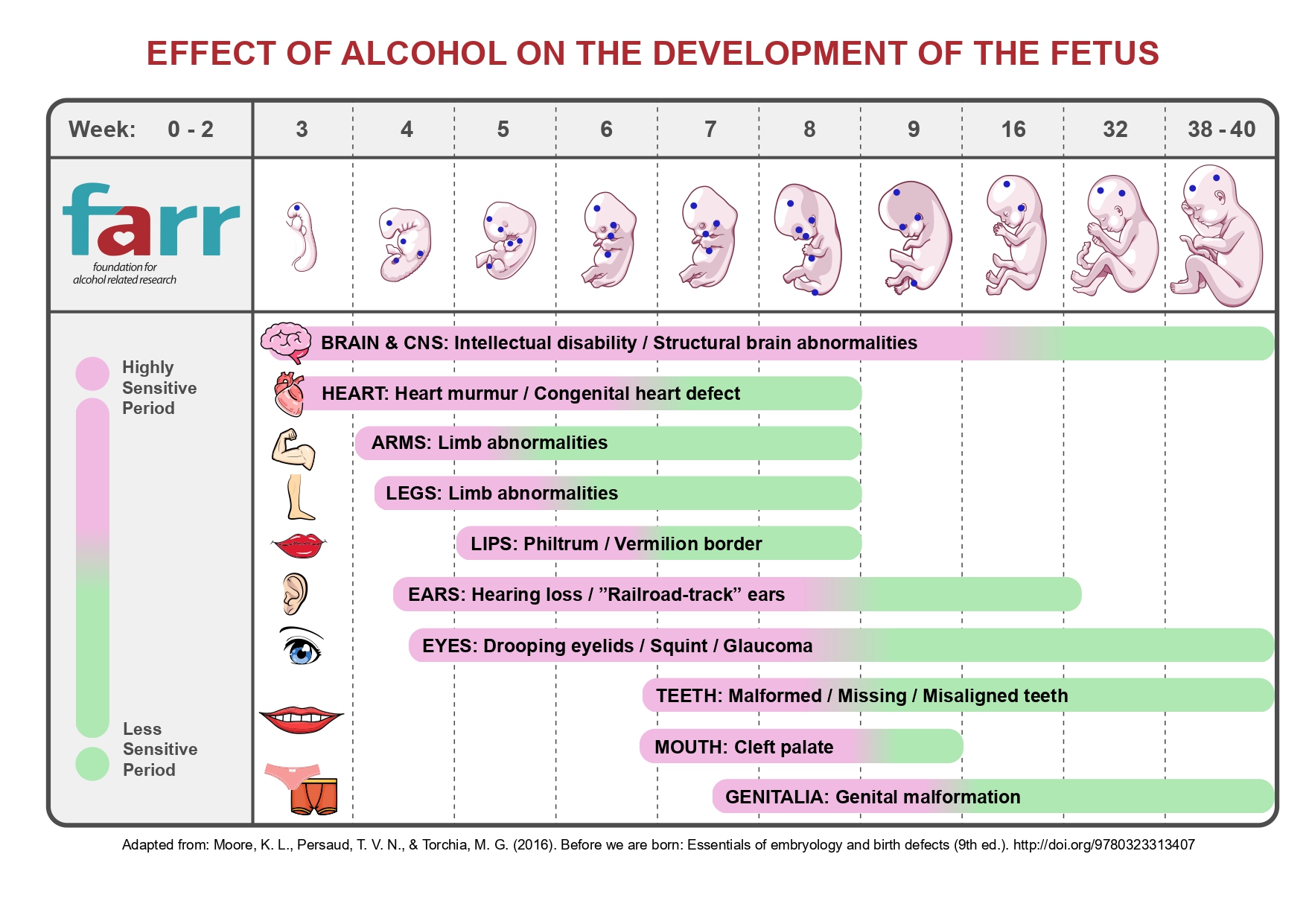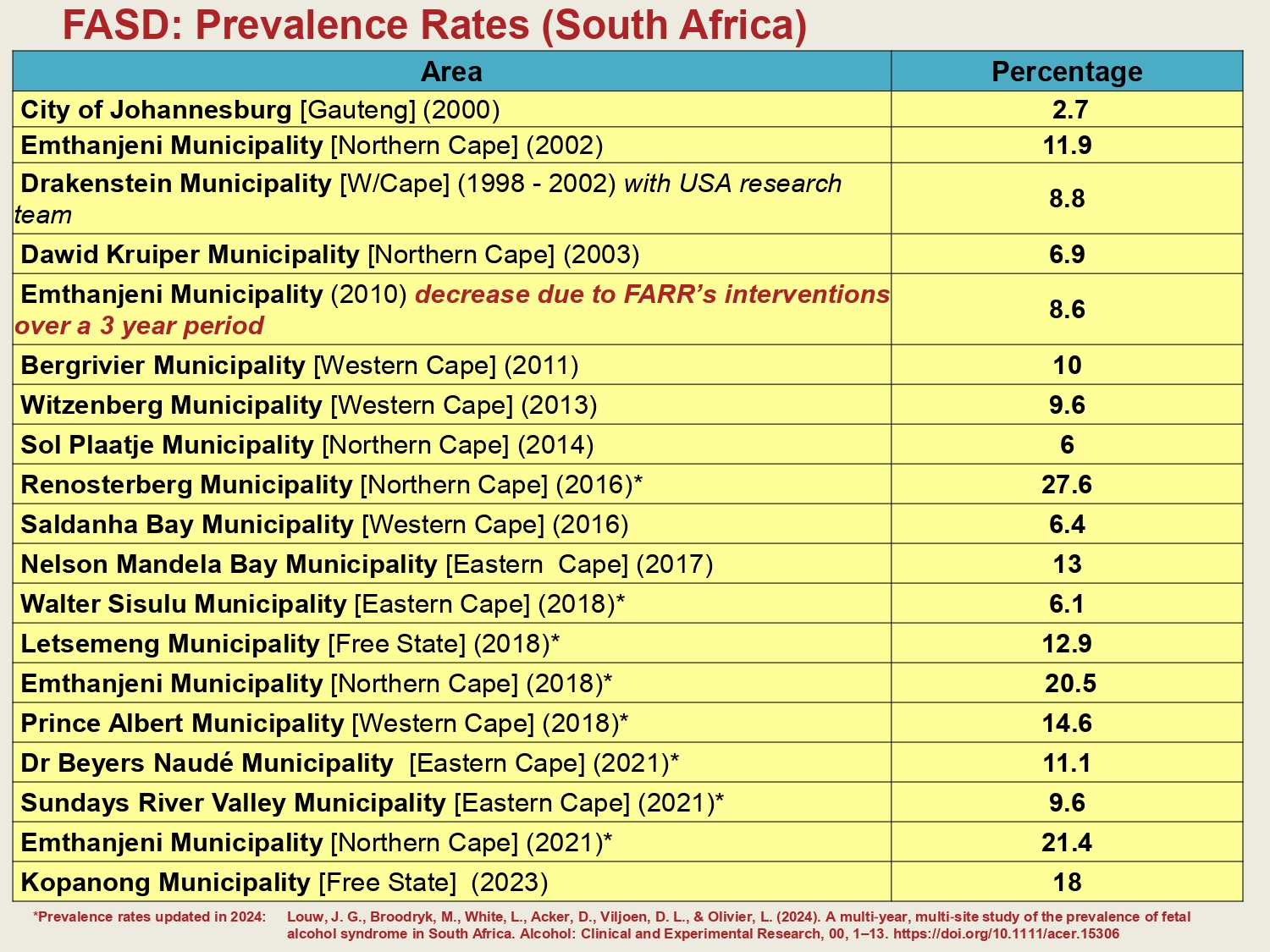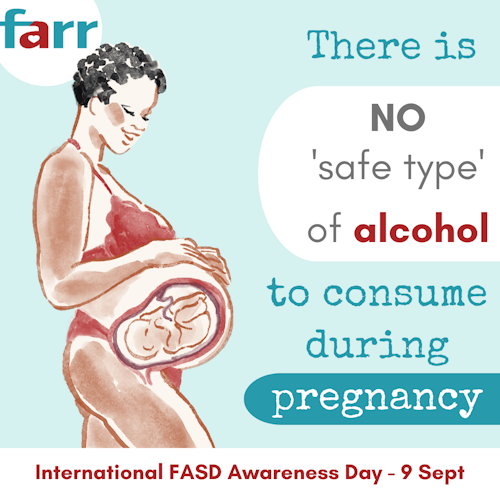The FARR Resource Library
Over the years FARR have collected a large amount of information and resources that we are able to share with interested parties. Should you require any further information regarding FARR and/or FASD, you are welcome to contact us on: info@farrsa.org.za or 021 686 2646
More Information
About FASD
Globally, Fetal Alcohol Spectrum Disorders (FASD) is the most common preventable form of mental- and physical disability. The damage caused to the developing fetus by alcohol exposure during pregnancy, is permanent and irreversible.
When an unborn baby is exposed to alcohol during pregnancy, it can interrupt normal embryonic and fetal development and lead to a range of birth defects and negative birth outcomes.
Not all individuals affected by alcohol exposure during pregnancy, show the same signs and symptoms. There are specific diagnostic labels assigned depending on how the affected person presents, but they all fall under the umbrella term: Fetal Alcohol Spectrum Disorders (FASD). This term highlights that the severity and nature of the damage, caused by alcohol exposure during pregnancy, is variable and, as a result of this, affected individuals lie on a spectrum.
Fetal Alcohol Spectrum Disorders (FASD) includes all possible disorders associated with prenatal alcohol exposure which includes:
- Fetal Alcohol Syndrome (FAS) – the most severe form of this disorder
- Partial Fetal Alcohol Syndrome (pFAS)
- Alcohol Related Neurodevelopmental Disorder (ARND)
- Alcohol Related Birth Defects (ARBD)
An individual with FASD may present with the following features:
- Small head circumference
- Pre- and postnatal growth restrictions (height & weight)
- Characteristic facial features
- Cognitive disabilities
- Behavioural disabilities
- Physical disabilities and birth defects (e.g. organ damage)
The fetal development chart above illustrates how an embryo and a fetus develop over time, and how alcohol can interfere with development.
- Pink sections: highlight the most vulnerable periods of development. Exposure to teratogens in this time will have the greatest impact on development.
- Green sections: indicate that the most critical period of development has passed, however the development is still sensitive to damage.
Almost any aspect of development is at risk of damage if the embryo or fetus is exposed to alcohol. The central nervous system, and the brain in particular, is the aspect of development most frequently affected. It is therefore important to note that the brain remains vulnerable to damage for the duration of pregnancy.
Alcohol can damage the developing fetus throughout the entire pregnancy and the damage caused is not isolated to any particular stage during pregnancy. The severity of FASD depends on the quantity and timing when alcohol is consumed during pregnancy, together with numerous other factors such as: the mothers’ body mass index and overall health, age, food consumption at the time the alcohol was ingested, genetic predisposition, other substances such as smoking, etc.
Important to note:
- There is no time during pregnancy when an embryo or fetus is not vulnerable to alcohol exposure.
- There is no risk-free amount of alcohol that can be used during pregnancy.
- The best decision is to completely abstain from alcohol use during pregnancy, or if a woman is planning to become pregnant.
International FASD Day
International FASD Day is commemorated on 9 September and is a day devoted to creating awareness about FASD and spreading the FASD Prevention Message: No amount of alcohol is safe any time during pregnancy.
This is a mayor event on FARR’s calendar, and you will find FARR Head Office Staff and Project Teams actively involved in various awareness campaigns during the month of September.
The FASD-knot is the international symbol reminding us about the risk of prenatal alcohol exposure. We encourage everyone to wear a FASD-knot as a token of support to the prevention of FASD, especially on or around the 9th of September.
What is the FASD knot?
The knot consists of a white rope tied in a specific way, known as the reef knot or the fisherman’s knot. The knot is worn on your chest to raise awareness about FASD.
 The knot symbolises the following:
The knot symbolises the following:
- The rope symbolises the umbilical cord whereby the unborn baby (fetus) is supposed to receive nutritious food and not alcohol;
- The worn ends of the rope is a reminder of the damage that prenatal alcohol use can cause to the central nervous system (brain) and other organs of the unborn baby;
- The knot is so strong that it will not break if traction is put on it, it will only pull tighter. This symbolizes the strong support that we are supposed to give pregnant women to abstain from alcohol use;
- The circle inside the knot symbolises the womb (uterus) of the pregnant women which should provide a safe environment for the unborn baby free of alcohol.
What is the FASD Button Badge?
The FASD Button Badge is a new design and initiative by FARR. The badge is 55mm in diameter and can be temporarily fastened to the surface of a garment using a safety pin attached to the back of the badge. It is durable and delivers a high impact message and imagery. The FASD Button Badge was specifically designed for International FASD Day and contains a digital representation of the FASD Knot and the prevention message: No alcohol is safe during pregnancy.
To order FASD-knots or Button Badges contact: info@farrsa.org.za or 021 686 2646.
FASD Prevalence Rates
The World Health Organisation estimates that less than 1% of individuals are affected by FASD globally. However, in South Africa our country’s FASD Prevalence rate is estimated to be 11%.
To date FARR has conducted 19 FASD Prevalence Studies (see table below) in 5 of the 9 provinces of South Africa (Free State, Gauteng, Northern Cape, Western Cape and Eastern Cape) since our establishment in 1997.
A FASD Prevalence Study is conducted to estimate the number of individuals affected by FASD in a certain community or municipal area. We then calculate a Prevalence Rate for that specific area and the extent of the problem in the form of a percentage or per 1 000 individuals in the population.
In our research, the Prevalence Rates were reported as high as 276 per 1000 (27.6%) in some communities in the Northern Cape Province (Louw et al., 2024). However, the highest published Prevalence Rate thus far is 31% and has been reported in South Africa, in an area in the Western Cape Province by other researchers (May et al., 2022). Compared to the World Health Organization’s estimate that the global FASD Prevalence Rate is less than 1%, this clearly highlights that FASD is a serious public health concern in South Africa.
*These findings can be generalized for the specific local municipal areas but it is not sufficient to provide a confirmed national prevalence rate for South Africa.
Research Publications
Refer to list of FARR publications
In the Media
The following section outlines articles and press releases about FARR and FASD:
2024:
Power FM: March Radio Interview (Part 1)
Power FM: March Radio Interview (Part 2)
RSG: May Radio Interview
Radio Khwezi: Sept Radio Interview
Smile FM: Sept Radio Interview
RSG: Oct Radio Interview
Trompsburg’s Voice: Newsletter Sept Publication (pg. 11-12)
Trompsburg’s Voice: Newsletter – May Publication (pg. 9)
Weslander: Foetal Alcohol Spectrum discussed
Prince Albert Friend: April Publication
Prince Albert Friend: August Publication
Prince Albert Friend: July Publication (pg. 35 – 36)
Cape Argus: International FASD Day
Cape Times: International FASD Day
Daily Voice: International FASD Day
Die Echo: Alcohol Harm Reduction Seminar (13 Sept 24)
Die Echo: International FASD Day (13 Sept 24)
Die Echo: DA International FASD day 2024
2023:
Gemsbok: Internasionale FASA-dag (pg.9)
Graaff-Reinet: Fetal Alcohol Spectrum Disorder highest in SA
Prince Albert Friend: March publication
Prince Albert Friend: July publication
Prince Albert Friend: August publication (pg. 24)
Prince Albert Friend: September publication
Prince Albert Friend: October publication
Trompsburg’s Voice: International FASD day commemorated in Trompsburg
Weekend Argus: International FASD day 9 September
Daily Maverick: SA needs more programmes to address foetal alcohol spectrum disorder, say experts
Daily Voice: International FASD day 9 September
Die Courier: 9 September
Die Echo: 9 September
Die Echo: A succesful international FASD day campaign for FARR
Die Echo: Beyond all limits
Die Echo: Bringing hope to the Britstown Community
Die Echo: FAStrap en Think Twice in die gemeenskap
Die Echo: Internasionale FASA dag
Die Echo: International FASD Day in Britstown
Elana Afrika’s Parent & Baby Brunch: Podcast – Can 1 drink really affect your unborn baby?
Prince Albert Friend: December Publication
2022:
Gemsbok: Internasionale FASA-dag herdenking
Prince Albert Friend: November publication
Aliwal Weekblad: FARR Burgersdorp hosted an art competition
Die Echo: A Journey of hope together
Die Echo: FASD day celebrated in September
Die Echo: Saamstaan teen FAS
Die Echo: Seminar for professionals
Gemsbok: FARR gee opleiding op Keimoes
2021:
Prince Albert Friend: February publication
Prince Albert Friend: March publication
Prince Albert Friend: April publication
Trouw – Dutch Newspaper publication: April publication
Prince Albert Friend: May publication
Die Echo: Better Together in Difficult Times
Die Echo: Britstown staan saam teen FASA (pg.8)
Die Echo: FARR Heritage Day (pg. 3)
Die Echo: Join FARR’s social media drive
Gemsbok: FARR se gesonde moeder gesonde baba werp goeie vrugte af
Noordkaap Bulletin: No alcohol while pregnant
2020:
Prince Albert Vriend: Vetplantjies
Die Son: FASD in die kollig
Die Echo: Community study calls for creative thinking in Covid-19
Die Echo: FARR and beyond
Die Echo: FARR Burgersdorp HMHB Baby Shower
Gemsbok: Bewusmaking van FASD op Upington op n baie spesiale manier
A Commercial Feature: September 9 – International Fetal Alcohol Spectrum Disorder (FASD) Day
2019:
Prince Albert Vriend: Geen Alkohol tydens Swangerskap
2018:
Die Burger: SA kan nie trots wees op die syfers nie
Netwerk 24: Kommer oor vroue se fuifdrinkery
Gemsbok: Upingtonners voltooi FAStrap Program
Die Tygerburger – De Grendel: Los die sopies as jy vermoed jy kan swanger raak
2017:
Die Tyger Burger: Protect your unborn baby
Algoa News: EC to unveil Provincial Drug Master Plan
Die Son: O-Kapenaars is te lief vir drank
Mail and Guardian: Prenatal alcohol exposure impacts brain function
RNews: Provincial drug master plan for the Eastern Cape
RNews: International Fetal Alcohol Spectrum Disorder (FASD) Day
SABC News: Men cautioned over foetal alcohol syndrome
Checkers Website News: Foetal Alcohol Syndrome
News 24: There may soon be a cure for foetal alcohol syndrome
SA Breweries Website News: Protecting the innocent
All Africa Website News: MEC Albert Fritz Launches Epwp Initiative to combat fetal alcohol syndrome
Cape Times: Partnership trains youth to fight foetal alcohol disorder
Sunday Times: Silence to highlight dangers of drinking while pregnant
Eyewitness News: Western and Eastern Cape record highest number of babies born with FAS disorder
Eyewitness News: SA records highest number of FASD cases in the world
George Herald: Your unborn baby drinks with you
Huffington Post: Fetal alcohol syndrome is a real crises in South Africa
In The Journals: Nearly eight in 1000 infants worldwide born with fetal alcohol spectrum disorder
PressReader Website News: Prenatal alcohol exposure impacts brain function
The Herald: Call to combat foetal alcohol spectrum disorders
Dorps Koerant: FASD International foetal alcohol spectrum disorder day
Eastern Cape Liqor Board Online News: FASD research and prevention project
Cape Argus: New initiative to tackle foetal alcohol spectrum disorder
Cape Argus: Alcohol is bane to your unborn kids
Psychiatry Advisor Online News: Foetal alcohol spectrum disorders
2016:
Cape Times: Study reveals SA’s ‘crisis’ due to alcohol
City Press: When I…
City Press: The war on drugs
Die Burger: Kinders met FAS kos die straat
Die Burger: Weskaapse leerlinge drink
Die Burger: Wynbedryf erg onstig
Die Burger: Robertson Wynberf doen meer skade
Die Son: Drank babas dis n krises
Echo: Geen hoeveelheid alkohol
Echo: FARR Open Day
Mail Guardian: It could also happen to you
Netwerk 24: Kinders met FAS kos staat miljoene
The New Age: Pregnant women cautioned
The New Age: Alcohol abuse by mothers-to-be
News 24: No amount of alcohol is safe during pregnancy
Weslander: Hopes positive message remains
Witzenberg Herald: FARR neem die voortou in Phillipstown
IOL Online News: SA’s FAS statistics
IOL Online News: FAS fails to dampen Tisha
2012:
Cape Times: Geneticist wins award
Die Tyger Burger: Gedenk FAS dag
2011:
BizCommunity: 25000 Babies born with FAS annually in South Africa



